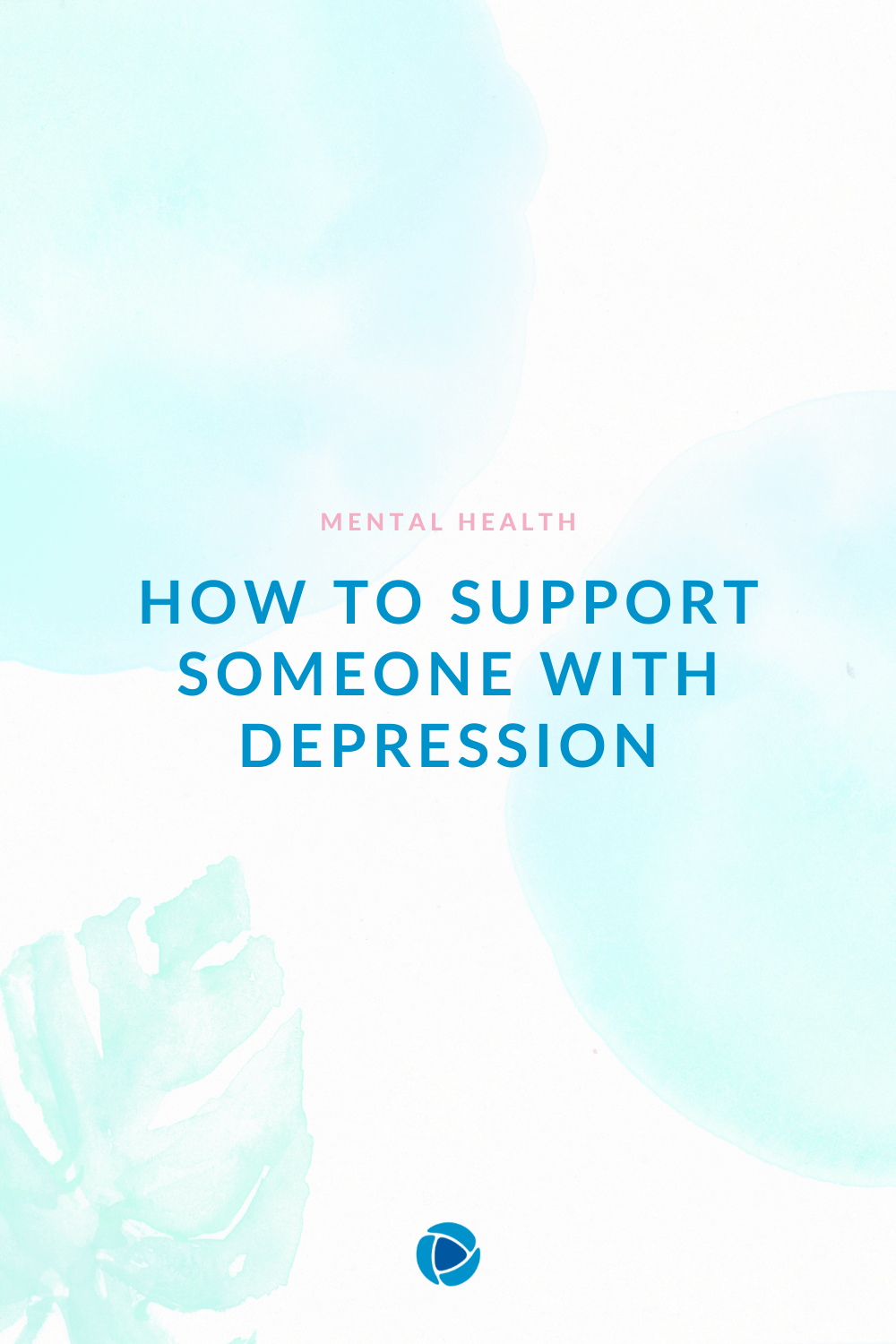
December 5, 2020
How to Support Someone with Depression
It is completely normal that we sometimes have a low mood and feel a little sad or down. However, if you know someone who is constantly feeling sad and cannot enjoy anything positive anymore for a longer period of time, your friend or partner might be experiencing symptoms of depression. The probability that you know someone close to you who is affected by depression is very high as 1 in 6 experience depression in any given week.
Depression is caused by multiple factors. Triggering factors may be linked to inherited genes, chronic diseases, stress, low income, unemployment, being under 30, female, giving birth, low self-esteem, loneliness, medication, drugs, anxiety disorder, traumatic experiences, or loss and bereavement. Also, depression is more common in women. However, men tend to find it harder to talk about their feelings. Therefore, it is important that you try to seek a conversation about the person’s feelings to show them that it is okay to open up and to signal that depression needs medical attention as any other physical injury.
People with depression show different symptoms which can be from psychological, physiological and social nature. As depression can develop very slowly, your friend or partner might not recognise the signs or does not want to acknowledge that he or she is not doing alright anymore. Consequently, you might end up in a situation where you first realise that help is required. For example, your friend or partner tells you that the sadness is eating them up from the inside out or she/he does not eat and sleep normally anymore. In severe cases, affected people with depression might believe that everyone is better off without them and that they are a burden to others. This is important to keep in mind as depression is an illness and not a selfish behaviour of intention seeking. Also, for them it may be too exhausting to do small tasks, they neglect themselves or their children, appear tired all the time and don’t show interest anymore in the activities they earlier enjoyed doing.
It may help you to know the multiple varieties of symptoms of depression so that you don’t feel that it is your fault that all your efforts to make him/her feel better result in automatic unhelpful thoughts or social withdrawal. If the person experiences five or more symptoms which endure for more than two weeks as well as interfere with her/his life and daily routine, it may be good to support your friend or partner to seek support with a GP or other form of professional support. It may be very overwhelming for the person to do the first step and pick up the phone, so you may ask for consent to schedule an appointment for him/her and provide company during the visit.
Psychological symptoms:
- Continuous low mood or sadness
- Hopeless and helpless
- Low self-esteem
- Tearful
- Guilt-ridden
- Irritable and intolerant of others
- Having no motivation or interest in things
- Finding it difficult to make decisions
- Not getting any enjoyment out of life
- Feeling anxious or worried
- Suicidal thoughts or thoughts of harming yourself
Physical Symptoms:
- Moving or speaking more slowly than usual
- Changes in appetite or weight (usually decreased, but sometimes increased)
- Constipation
- Unexplained aches and pains
- Lack of energy
- Low sex drive (loss of libido)
- Changes to the menstrual cycle
- Disturbed sleep – for example, finding it difficult to fall asleep at night or waking up very early in the morning
Social Symptoms:
- Avoiding contact with friends and taking part in fewer social activities
- Neglecting hobbies and interests
- Having difficulties in your home, work or family life
(NHS, 2020)
Moreover, it may be helpful for you to know that there are multiple forms and severities of depression. Symptoms of depression can range on a continuum from mild, having some impact on their daily life, to moderate and severe where the person is unable to cope on a daily basis. Forms of depression include Postnatal depression which women may experience after having a baby, Seasonal affective disorder (typical during wintertime) and Bipolar disorder which is characterised by episodes of depression and mania (high mood). It is not your responsibility to diagnose or treat but depending on the level and the previously outlined strength of symptoms you may act accordingly and offer support or signpost to professional support.
It can be very difficult to support someone with depression and not tell your friend or partner to pull himself together. Especially, if you live together and your daily life gets disturbed by your partner’s sadness and negativity. Please keep in mind that it is neither yours nor your partner’s fault. The earlier we intervene with treatment after the onset of symptoms, the better may be the prognosis for recovery. Therefore, please don’t wait to seek the conversation due to insecurity and offer your direct support in seeking professional help.
Tips for giving support:
1. Let the person know that you care about her/him and that you are listening:
It is very important that you show the person that you are there for her/him. Do not force the discussion but sensitively try to encourage the person to open up. It may be difficult for your partner or friend to talk about personal feelings so you may want to offer words of encouragement such as ‘I have been feeling concerned about you lately and you should know that I am here for you’ or ‘Is there anything I can support you with?.’ Even if you don’t see each other, keep in touch through phone calls, messages or emails to show the person that you care. It’s all about being there for the other person without the need to talk about the issue itself.
2. Show acceptance without any signs of judgement
Please remember, that it is not personal and no one’s fault. If your partner or friend would rather be left alone or spend some time off, it is not because your partner does not like to be with you anymore. It may be the only accessible coping mechanism for the time being. If you accept that, you are already very supportive. However, if you feel that your friend or partner is at risk for themselves or their children you may ignore the wish for loneliness and seek professional support for the person.
3. Encourage self-management
Outline the importance of physical exercise, eating a balanced diet, and doing things one used to enjoy. You may encourage your partner or friend to do a workout together or cook her/her favourite meal.
4. Inform yourself about services available in their area
You may want to research psychological therapy services or depression support groups. Often, people with depression don’t seek help. It may be all too much for them and or they fear of being judged. Without forcefully trying the other to seek help, have a genuine conversation about the need for help. It may help if you do the effort and search for support options in the area as information may be very overwhelming especially for someone who is focused on all negative aspects of life.
5. Take care of yourself
Even though your partner or friend might isolate themselves, try to keep up with seeing your friends and family. It is important that you keep in mind that you cannot cure the person but offer support to the level you still feel you can cope with your own life. Don’t blame yourself if you cannot cope with the situation anymore and allow yourself to ask for consent to seek professional support or seek support for yourself. It is not a betrayal if you join a support group or talk to a counsellor or coach about your emotions and feelings.
6. If there is risk:
- If the person you’re worried about expresses suicidal feelings, you or they should contact a GP or NHS 111 immediately.
- You can also contact Samaritans on 116 123 for confidential 24-hour support.
- Hear how friends and family helped other people with depression on healthtalk.org
- Childline (0800 1111) runs a helpline for children and young people in the UK
7. Additional sources:
- Chartered psychologists within your area: https://www.bps.org.uk
- Further information: http://www.nhs.uk/Conditions/Suicide/Pages/Getting-help.aspx
- An app to build resilience and help prevent stress, anxiety and mild depression through clinically proven techniques (NHS approved): https://thrive.uk.com
Topics mentioned in this blog post:
Get the latest news with
Thrive Unplugged!
Sign up to our monthly newsletter to receive the latest news on everything Thrive Mental Wellbeing.








